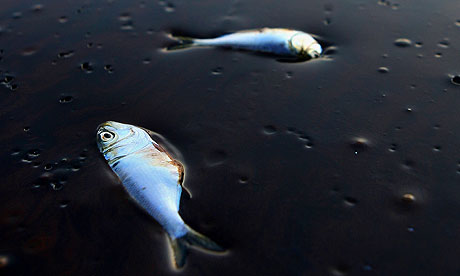 A sobering new report warns that the oceans face a "fundamental and irreversible ecological transformation" not seen in millions of years as greenhouse gases and climate change already have affected temperature, acidity, sea and oxygen levels, the food chain and possibly major currents that could alter global weather.
A sobering new report warns that the oceans face a "fundamental and irreversible ecological transformation" not seen in millions of years as greenhouse gases and climate change already have affected temperature, acidity, sea and oxygen levels, the food chain and possibly major currents that could alter global weather.
The report, in Science magazine, brings together dozens of studies that collectively paint a dismal picture of deteriorating ocean health.
It's not just BP's oil in the Gulf that threatens world's oceans
Special Report: Should BP nuke its leaking well?
A nuclear fix to the leaking well has been touted online and in the occasional newspaper op-ed for weeks now. Washington has repeatedly dismissed the idea and BP execs say they are not considering an explosion -- nuclear or otherwise. But as a series of efforts to plug the 60,000 barrels of oil a day gushing from the sea floor have failed, talk of an extreme solution refuses to die.
Oil found in Gulf crabs raises new food chain fears
 University scientists have spotted the first indications oil is entering the Gulf seafood chain — in crab larvae — and one expert warns the effect on fisheries could last “years, probably not a matter of months” and affect many species.
University scientists have spotted the first indications oil is entering the Gulf seafood chain — in crab larvae — and one expert warns the effect on fisheries could last “years, probably not a matter of months” and affect many species.
Scientists with the University of Southern Mississippi and Tulane University in New Orleans have found droplets of oil in the larvae of blue crabs and fiddler crabs sampled from Louisiana to Pensacola, Fla.
Whistle blower to testify on oil spill worst fear:BP deliberately sinks oil with Corexit as cover up
.PNG)
Biologists find 'dead zones' around BP oil spill in Gulf
 Scientists are confronting growing evidence that BP's ruptured well in the Gulf of Mexico is creating oxygen-depleted "dead zones" where fish and other marine life cannot survive.
Scientists are confronting growing evidence that BP's ruptured well in the Gulf of Mexico is creating oxygen-depleted "dead zones" where fish and other marine life cannot survive.
In two separate research voyages, independent scientists have detected what were described as "astonishingly high" levels of methane, or natural gas, bubbling from the well site, setting off a chain of reactions that suck the oxygen out of the water. In some cases, methane concentrations are 100,000 times normal levels.
Monsanto GM seed ban is overturned by US Supreme Court
 The bio-tech company Monsanto can sell genetically modified seeds before safety tests on them are completed, the US Supreme Court has ruled. A lower court had barred the sale of the modified alfalfa seeds until an environmental impact study could be carried out.
The bio-tech company Monsanto can sell genetically modified seeds before safety tests on them are completed, the US Supreme Court has ruled. A lower court had barred the sale of the modified alfalfa seeds until an environmental impact study could be carried out.
But seven of the nine Supreme Court Justices decided that ruling was unconstitutional.
BP Funds Front Group Claiming Oil Spill Jobs Are Better Than ‘Normal’ Ones, Storm Will Clean Up Oil
 Current oil drilling trade association head Randall Luthi, who previously worked for Dick Cheney on the team that signed off on a vast expansion of dangerous drilling leases and who later served in the Minerals Management Service in the Bush administration, gave a presentation at the conference. Sen. Lisa Murkowski (R-AK), a close friend of the oil industry who previously said wellhead blowouts are “impossible,” spoke at the Foundation conference, telling attendees “we should be careful and not pass reactionary legislation that hasn’t been fully thought through” in response to the spill. Notably, Murkowski blocked legislation to raise the liability cap for oil companies.
Current oil drilling trade association head Randall Luthi, who previously worked for Dick Cheney on the team that signed off on a vast expansion of dangerous drilling leases and who later served in the Minerals Management Service in the Bush administration, gave a presentation at the conference. Sen. Lisa Murkowski (R-AK), a close friend of the oil industry who previously said wellhead blowouts are “impossible,” spoke at the Foundation conference, telling attendees “we should be careful and not pass reactionary legislation that hasn’t been fully thought through” in response to the spill. Notably, Murkowski blocked legislation to raise the liability cap for oil companies.
More Articles...
Page 162 of 202

 Environmental Glance
Environmental Glance






























